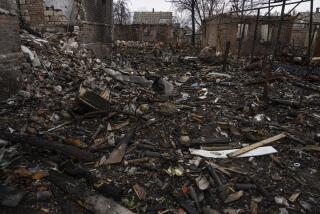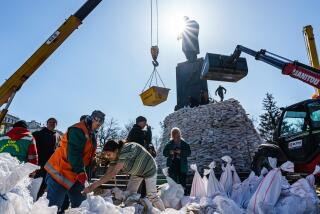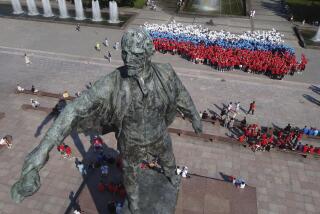The World Must Not Look Away
- Share via
Chechnya has always resisted absorption into the Russian empire, beginning under the 19th century czars and continuing under the Communists and into the post-Soviet era. From the start, its resistance was answered by ruthless repression, directed without distinction against civilians and combatants alike. The Chechens have fought no less brutally. The renewal of fighting since 1994 has seen sweeping destruction and loss of life. This, in a general way, the world knows. Far less visible has been the unrestrained barbarity with which war has been waged. The true horror of the fighting in Chechnya lies in the details.
Maura Reynolds and Robyn Dixon of The Times’ Moscow bureau have visited that horror and described it graphically. Chechnya is a battle zone where the rules laid down by the Geneva Convention are ignored, where Russian forces regularly commit atrocities without fear of being held accountable by their superiors, where the Chechens routinely resort to torture, mutilation and murder of their captives. Chechnya is a no-quarter war without heroes. Each side demonizes the other to justify the terrible things it does. Each side dehumanizes itself by the terrible things it does.
Moscow, with the approval of most Russians, fights doggedly to hold Chechnya to keep its access to natural resources and because it knows that if the Chechens succeed in breaking away, other restive peoples in the multiethnic country will be inspired to seek their own independence. But Russians also fight brutally because that is part of the Russian military ethos, a tradition of total war fought with every means and without moral restraints. The civil war that followed the 1917 Bolshevik Revolution was marked by almost unimaginable cruelties. And when the tide of battle turned in World War II, Russia repaid in kind the barbarism practiced by Germany after its 1941 invasion.
Chechnya, Russian leaders insist, is an internal matter and not the business of outsiders. They are half right. International law does recognize the fighting as an internal matter, but that doesn’t preclude humanitarian concerns about what this vicious conflict involves. Human rights organizations have called frequent attention to the abuses occurring in Chechnya, though with only limited impact. Perhaps reporting of the kind done by Reynolds and Dixon will help deepen those concerns. Chechens have suffered much under nearly two centuries of Russian rule. And Russians can’t escape suffering themselves as they try to maintain that rule.
More to Read
Sign up for Essential California
The most important California stories and recommendations in your inbox every morning.
You may occasionally receive promotional content from the Los Angeles Times.










